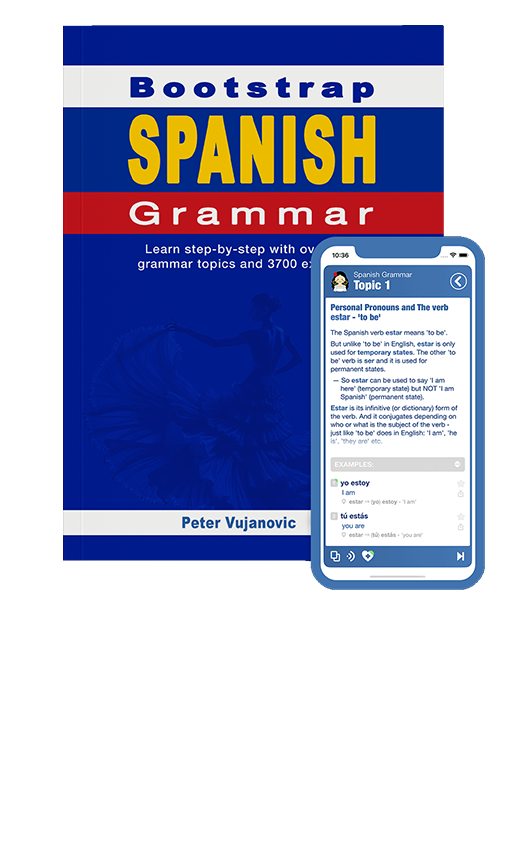Spanish grammar - Common Verbs with irregular past participles |
|||
|
|||
Some very common verbs have irregular past participles that do not follow the regular formation rules. Here are 10 of the most common verbs with irregular past participles: • hacer ('to do', 'to make') ⇒ hecho • decir ('to say', 'to tell') ⇒ dicho • ver ('to see') ⇒ visto • escribir ('to write') ⇒ escrito • romper ('to break') ⇒ roto • volver ('to return') ⇒ vuelto • poner ('to put') ⇒ puesto • abrir ('to open') ⇒ abierto • cubrir ('to cover') ⇒ cubierto • morir ('to die') ⇒ muerto |
| Examples: | |
|
¿Has hecho la tarea?
Have (you, familiar) done the homework?
|
|
|
No he hecho nada hoy.
(I) have not done anything today.
|
|
|
María ha dicho la verdad, pero no la creyeron.
María has told the truth, but they did not believe her.
|
|
|
¿Has dicho algo interesante?
Have (you, familiar) said anything interesting?
|
|
|
El director ha visto la película, pero no le ha gustado.
The director has seen the movie, but he didn't like it.
|
|
|
¿Has visto a Juan recientemente?
Have (you, familiar) seen Juan recently?
|
|
|
El profesor ha escrito una carta y la ha enviado.
The teacher has written a letter and (he) has sent it.
|
|
|
¿Has escrito tu ensayo?
Have (you, familiar) written your essay?
|
|
|
Mi hermano ha roto el vaso y ahora tiene que comprar otro.
My brother has broken the glass and now (he) has to buy another one.
|
|
|
¿Has roto algo importante?
Have (you, familiar) broken something important?
|
|
|
Luisa ha vuelto a casa tarde porque tenía una reunión.
Luisa has returned home late because (she) had a meeting.
|
|
|
No hemos vuelto a ese restaurante desde el año pasado.
(We) have not returned to that restaurant since last year.
|
|
|
Juan ha puesto la mesa y ahora vamos a cenar.
Juan has set the table and now (we) are going to have dinner.
|
|
|
¿Has puesto las llaves en la mesa?
Have (you, familiar) put the keys on the table?
|
|
|
El portero ha abierto la puerta, pero no ha entrado nadie.
The doorman has opened the door, but no one came in.
|
|
|
¿Has abierto la ventana?
Have (you, familiar) opened the window?
|
|
|
La chef ha cubierto el pastel con chocolate.
The chef has covered the cake with chocolate.
|
|
|
No hemos cubierto todos los temas en clase.
(We) have not covered all the topics in class.
|
|
|
Me he muerto de risa con esa broma.
(I) have died laughing at that joke.
|
|
|
¿Has muerto en el juego alguna vez?
Have (you, familiar) ever died in the game?
|
|
 |
|




